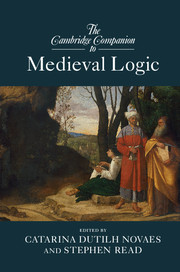Book contents
- Frontmatter
- Contents
- List of Contributors
- Introduction
- PART I PERIODS AND TRADITIONS
- PART II THEMES
- 8 Logica Vetus
- 9 Supposition and Properties of Terms
- 10 Propositions: Their Meaning and Truth
- 11 Sophisms and Insolubles
- 12 The Syllogism and Its Transformations
- 13 Consequence
- 14 The Logic of Modality
- 15 Obligationes
- Bibliography
- Index
14 - The Logic of Modality
from PART II - THEMES
Published online by Cambridge University Press: 05 September 2016
- Frontmatter
- Contents
- List of Contributors
- Introduction
- PART I PERIODS AND TRADITIONS
- PART II THEMES
- 8 Logica Vetus
- 9 Supposition and Properties of Terms
- 10 Propositions: Their Meaning and Truth
- 11 Sophisms and Insolubles
- 12 The Syllogism and Its Transformations
- 13 Consequence
- 14 The Logic of Modality
- 15 Obligationes
- Bibliography
- Index
Summary
INTRODUCTION
The logical analysis of modalities, as initiated in Aristotle's On Interpretation and Prior Analytics, focused on the inferential relations among modal propositions, i.e. propositions concerning necessity, possibility and contingency. The Aristotelian legacy of modal logic underwent major transformations in medieval times, in both the Arabic and the Latin traditions. But these transformations took very different forms in the two traditions. The corpus of Aristotle's works was available in Arabic translation at a very early stage as a result of the translation movement that flourished under the ʿAbbāsid caliphate in eighth- to tenth-century Baghdad. Crucial works for modal logic such as Aristotle's On Interpretation and Prior Analytics, as well as texts of indirect but equally significant relevance from the physical and metaphysical corpus were known to logicians in this tradition from the very start. In the Latin tradition, a comprehensive response to Aristotle's writings on the logic of modality had to await the rediscovery in the late twelfth century of the full text of Prior Analytics. The early availability of the key Aristotelian texts to the Arabic world sparked an interpretive effort whose primary concerns were to understand those texts and to resolve the difficulties which they posed. The first fruits of this effort were the commentaries of al-Fārābī (d. 950), whose long commentary on Prior Analytics has, sadly, not survived. The commentatorial tradition in the Arabic-Islamic world reached its apogee in the works of Averroes (d. 1198). The earliest Latin commentary on Prior Analytics, an anonymous and incomplete work, dates from the late twelfth century. The earliest known complete Latin commentary is that of Robert Kilwardby (d. 1279), although, as we shall see below, some of his ideas about the meaning of modal sentences have precedents in the writings of Peter Abelard (d. 1142).
Long before Kilwardby's time, modal logic had received an extraordinary impulse in the Arabic-Islamic world, in the figure of Avicenna (d. 1037), who developed a new and original system that departed from Aristotle in crucial ways. Avicenna's system in effect relegated Aristotle's modal logic to a purely marginal role. The work of the post-Avicennan logicians, particularly in the twelfth- and thirteenth-century Eastern tradition, evolved in ways that are entirely independent of Aristotle and seem to be motivated exclusively by the need to go beyond Avicenna's system (Rāzī d. 1210; Khūnajī d. 1248; Kātibī d. 1276) or to defend it (Ṭūsī d. 1274).
- Type
- Chapter
- Information
- The Cambridge Companion to Medieval Logic , pp. 342 - 369Publisher: Cambridge University PressPrint publication year: 2016
- 4
- Cited by



